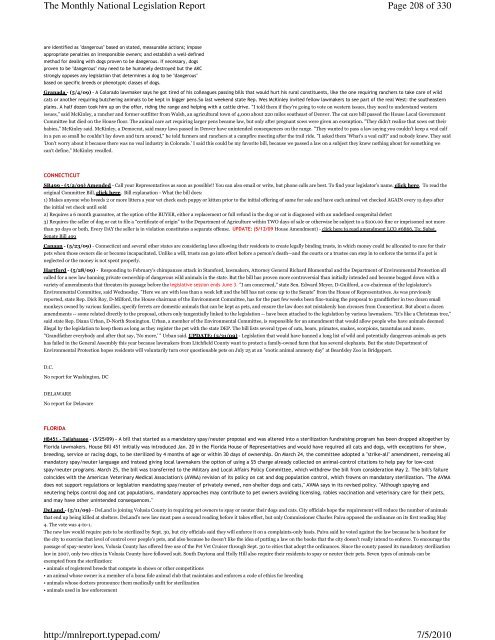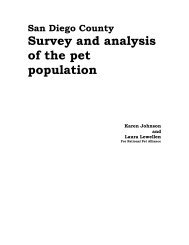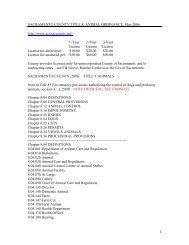<strong>The</strong> <strong>Monthly</strong> <strong>National</strong> <strong>Legislation</strong> <strong>Report</strong>http://mnlreport.typepad.com/<strong>Page</strong> 208 <strong>of</strong> <strong>330</strong>7/5/<strong>2010</strong>are identified as "dangerous" based on stated, measurable actions; imposeappropriate penalties on irresponsible owners; and establish a well-definedmethod for dealing with dogs proven to be dangerous. If necessary, dogsproven to be "dangerous" may need to be humanely destroyed but the AKCstrongly opposes any legislation that determines a dog to be "dangerous"based on specific breeds or phenotypic classes <strong>of</strong> dogs.Granada - (5/4/09) - A Colorado lawmaker says he got tired <strong>of</strong> his colleagues passing bills that would hurt his rural constituents, like the one requiring ranchers to take care <strong>of</strong> wildcats or another requiring butchering animals to be kept in bigger pens.So last weekend state Rep. Wes McKinley invited fellow lawmakers to see part <strong>of</strong> the real West: the southeasternplains. A half dozen took him up on the <strong>of</strong>fer, riding the range and helping with a cattle drive. "I told them if they're going to vote on western issues, they need to understand westernissues," said McKinley, a rancher and former outfitter from Walsh, an agricultural town <strong>of</strong> 4,000 about 220 miles southeast <strong>of</strong> Denver. <strong>The</strong> cat care bill passed the House Local GovernmentCommittee but died on the House floor. <strong>The</strong> animal care act requiring larger pens became law, but only after pregnant sows were given an exemption. "<strong>The</strong>y didn't realize that sows eat theirbabies," McKinley said. McKinley, a Democrat, said many laws passed in Denver have unintended consequences on the range. "<strong>The</strong>y wanted to pass a law saying you couldn't keep a veal calfin a pen so small he couldn't lay down and turn around," he told farmers and ranchers at a campfire meeting after the trail ride. "I asked them 'What's a veal calf?' and nobody knew. <strong>The</strong>y said'Don't worry about it because there was no veal industry in Colorado.' I said this could be my favorite bill, because we passed a law on a subject they knew nothing about for something wecan't define," McKinley recalled.CONNECTICUTSB499 - (5/2/09) Amended - Call your Representatives as soon as possible!! You can also email or write, but phone calls are best. To find your legislator’s name, click here. To read theoriginal Committee Bill, click here. Bill explanation - What the bill does:1) Makes anyone who breeds 2 or more litters a year vet check each puppy or kitten prior to the initial <strong>of</strong>fering <strong>of</strong> same for sale and have each animal vet checked AGAIN every 15 days afterthe initial vet check until sold2) Requires a 6 month guarantee, at the option <strong>of</strong> the BUYER, either a replacement or full refund in the dog or cat is diagnosed with an undefined congenital defect3) Requires the seller <strong>of</strong> dog or cat to file a “certificate <strong>of</strong> origin” to the Department <strong>of</strong> Agriculture within TWO days <strong>of</strong> sale or otherwise be subject to a $100.00 fine or imprisoned not morethan 30 days or both. Every DAY the seller is in violation constitutes a separate <strong>of</strong>fense. UPDATE: (5/12/09 House Amendment) - click here to read amendment LCO #6866, To: Subst.Senate Bill 499Canaan - (5/23/09) - Connecticut and several other states are considering laws allowing their residents to create legally binding trusts, in which money could be allocated to care for theirpets when those owners die or become incapacitated. Unlike a will, trusts can go into effect before a person's death—and the courts or a trustee can step in to enforce the terms if a pet isneglected or the money is not spent properly.Hartford - (5/28/09) - Responding to February's chimpanzee attack in Stamford, lawmakers, Attorney General Richard Blumenthal and the Department <strong>of</strong> Environmental Protection allcalled for a new law banning private ownership <strong>of</strong> dangerous wild animals in the state. But the bill has proven more controversial than initially intended and become bogged down with avariety <strong>of</strong> amendments that threaten its passage before the legislative session ends June 3. "I am concerned," state Sen. Edward Meyer, D-Guilford, a co-chairman <strong>of</strong> the legislature'sEnvironmental Committee, said Wednesday. "Here we are with less than a week left and the bill has not come up to the Senate" from the House <strong>of</strong> Representatives. As was previouslyreported, state Rep. Dick Roy, D-Milford, the House chairman <strong>of</strong> the Environment Committee, has for the past few weeks been fine-tuning the proposal to grandfather in two dozen smallmonkeys owned by various families, specify ferrets are domestic animals that can be kept as pets, and ensure the law does not mistakenly ban circuses from Connecticut. But about a dozenamendments -- some related directly to the proposal, others only tangentially linked to the legislation -- have been attached to the legislation by various lawmakers. "It's like a Christmas tree,"said state Rep. Diana Urban, D-North Stonington. Urban, a member <strong>of</strong> the Environmental Committee, is responsible for an amendment that would allow people who have animals deemedillegal by the legislation to keep them as long as they register the pet with the state DEP. <strong>The</strong> bill lists several types <strong>of</strong> cats, bears, primates, snakes, scorpions, tarantulas and more."Grandfather everybody and after that say, 'No more,' " Urban said. UPDATE: (5/31/09) - <strong>Legislation</strong> that would have banned a long list <strong>of</strong> wild and potentially dangerous animals as petshas failed in the General Assembly this year because lawmakers from Litchfield County want to protect a family-owned farm that has several elephants. But the state Department <strong>of</strong>Environmental Protection hopes residents will voluntarily turn over questionable pets on July 25 at an "exotic animal amnesty day" at Beardsley Zoo in Bridgeport.D.C.No report for Washington, DCDELAWARENo report for DelawareFLORIDAHB451 - Tallahassee - (5/25/09) - A bill that started as a mandatory spay/neuter proposal and was altered into a sterilization fundraising program has been dropped altogether byFlorida lawmakers. House Bill 451 initially was introduced Jan. 20 in the Florida House <strong>of</strong> Representatives and would have required all cats and dogs, with exceptions for show,breeding, service or racing dogs, to be sterilized by 4 months <strong>of</strong> age or within 30 days <strong>of</strong> ownership. On March 24, the committee adopted a "strike-all" amendment, removing allmandatory spay/neuter language and instead giving local lawmakers the option <strong>of</strong> using a $5 charge already collected on animal-control citations to help pay for low-costspay/neuter programs. March 25, the bill was transferred to the Military and Local Affairs Policy Committee, which withdrew the bill from consideration May 2. <strong>The</strong> bill's failurecoincides with the American Veterinary Medical Association's (AVMA) revision <strong>of</strong> its policy on cat and dog population control, which frowns on mandatory sterilization. "<strong>The</strong> AVMAdoes not support regulations or legislation mandating spay/neuter <strong>of</strong> privately owned, non-shelter dogs and cats," AVMA says in its revised policy. "Although spaying andneutering helps control dog and cat populations, mandatory approaches may contribute to pet owners avoiding licensing, rabies vaccination and veterinary care for their pets,and may have other unintended consequences."DeLand - (5/11/09) - DeLand is joining Volusia County in requiring pet owners to spay or neuter their dogs and cats. City <strong>of</strong>ficials hope the requirement will reduce the number <strong>of</strong> animalsthat end up being killed at shelters. DeLand’s new law must pass a second reading before it takes effect, but only Commissioner Charles Paiva opposed the ordinance on its first reading May4. <strong>The</strong> vote was 4-to-1.<strong>The</strong> new law would require pets to be sterilized by Sept. 30, but city <strong>of</strong>ficials said they will enforce it on a complaints-only basis. Paiva said he voted against the law because he is hesitant forthe city to exercise that level <strong>of</strong> control over people’s pets, and also because he doesn’t like the idea <strong>of</strong> putting a law on the books that the city doesn’t really intend to enforce. To encourage thepassage <strong>of</strong> spay-neuter laws, Volusia County has <strong>of</strong>fered free use <strong>of</strong> the Pet Vet Cruiser through Sept. 30 to cities that adopt the ordinances. Since the county passed its mandatory sterilizationlaw in 2007, only two cities in Volusia County have followed suit. South Daytona and Holly Hill also require their residents to spay or neuter their pets. Seven types <strong>of</strong> animals can beexempted from the sterilization:• animals <strong>of</strong> registered breeds that compete in shows or other competitions• an animal whose owner is a member <strong>of</strong> a bona fide animal club that maintains and enforces a code <strong>of</strong> ethics for breeding• animals whose doctors pronounce them medically unfit for sterilization• animals used in law enforcement
<strong>The</strong> <strong>Monthly</strong> <strong>National</strong> <strong>Legislation</strong> <strong>Report</strong>http://mnlreport.typepad.com/<strong>Page</strong> 209 <strong>of</strong> <strong>330</strong>7/5/<strong>2010</strong>• service animals who assist people with disabilities• animals whose owners have a contract for breeding the animals• hunting or herding animals registered with a bona fide hunting or herding organization.Contact info for the city: http://www.deland.org/cityhall/index.htmLee County - Cape Coral - (5/30/09) - Lee County Animal Services is instituting a trap, neuter, and release program (or TNR) in hopes <strong>of</strong> controlling the feral cat population. A first forLee County, the program was developed with help from the public as well as utilizing input from University <strong>of</strong> Florida. <strong>The</strong> TNR program hopes to put power into the hands <strong>of</strong> the public by<strong>of</strong>fering education, traps, and assistance in catching cats.Ormond Beach - (5/24/09) - <strong>The</strong> Ormond Beach City Commission has tentatively approved a requirement that all cats and dogs in the city be fixed -- unless, as one commissioner put it,the animals are "gainfully employed." <strong>The</strong> city already requires that all pet owners pay a $5 fee to license their animals, which must also be up-to-date on all the required shots. On Tuesday,commissioners voted unanimously on first reading to require that dogs and cats older than 6 months must be spayed or neutered to get a city license, unless the animal qualifies for anexemption. Violators would face a $100 fine or the police chief could send them to the code enforcement board.Tarpon Springs - (5/30/09) - It may soon be illegal to chain dogs outside for long periods <strong>of</strong> time. City commissioners learned Tuesday night many dogs are chained outside, in the hotsun, for several hours in a practice called tethering. Commissioners agreed that dogs in the city should be treated more humanely. <strong>The</strong>y endorsed an idea to pattern a local ordinance after oneadopted five years ago in Wichita, Kan. <strong>The</strong> local ordinance would prohibit tethering a dog for longer than one hour at a time or for more than three hours a day. <strong>The</strong> ordinance would requirea three-hour interval between each hour a dog can be tethered. A chain would have to be three times the length <strong>of</strong> the dog but not allow the animal to reach the right <strong>of</strong> way. Choke or chaincollars would not be allowed. Commissioners requested city legal staff design a local version based on the Kansas ordinance for consideration at a future meeting.GEORGIACordele - (5/31/09) - A county resident is puzzled over the absence <strong>of</strong> a leash law to protect residents from dogs on the loose. <strong>The</strong>re are dogs in the area that virtually terrorize theneighborhood and it is becoming a growing safety concern. Owners <strong>of</strong> the dogs have been informed <strong>of</strong> the situation, but turn a deaf ear to the problems. <strong>The</strong> reason is because there is noexisting leash law within the county. “<strong>The</strong> reason there is no leash law in the county is because most people that live in unincorporated areas prefer not to have one,” said CountyAdministrator Gene Crapse. “Some people move to the country so they can allow their animals to run free. <strong>The</strong>y choose not to have street lights because they can see the stars better atnight. Some <strong>of</strong> them don’t even want their roads paved.”Forsyth County - (5/30/09) - Residents have a final chance to sound <strong>of</strong>f on proposed changes to Forsyth County's animal control ordinance that would make illegal the tethering, or chaining,<strong>of</strong> dogs for more than three hours. <strong>The</strong> proposed ordinance also addresses matters such as adequate food, water, shelter and space for animals. <strong>The</strong> public hearing is set for 5:30 p.m. Mondayin the county administration building. A decision could follow. <strong>The</strong> county commission took no action on the matter at the first public hearing May 7, though residents took the opportunity tolet the board know how they felt. Enforcement would be complaint-based. If passed, there would be a six-month period before the measure would take effect. Neighboring Cherokee andFulton counties have adopted similar anti-tethering ordinances, as has the city <strong>of</strong> Gainesville.Gwinnett - (5/3/09) - <strong>The</strong> Gwinnett Animal Advisory Council (GAAC) met on Tuesday, April 21, to consider proposed changes to the county's animal ordinance. A spirited discussion, shroudedin contemptuous overtones that pervaded for two plus hours, focused on nuisance dog barking and tethering restrictions. From this writer's perspective, representing "We, the Pet Owners <strong>of</strong>Gwinnett," a grassroots group <strong>of</strong> concerned pet owners, the feeling tone set by GAAC is reflective <strong>of</strong> a common malady: fear <strong>of</strong> change. Nonetheless, considerable progress was made in thatGAAC and We, the Pet Owners <strong>of</strong> Gwinnett each made compromises in revising nuisance dog barking and tethering guidelines. As a result, a modified animal ordinance was crafted, to besubmitted to the Gwinnett County Commission for their recommendations and approval. GAAC member Carla Brown worked diligently to resolve contentious issues and deserves thecommunity's thanks for her efforts.Although the proposal presented by We, the Pet Owners <strong>of</strong> Gwinnett wasn't adopted in its entirety, consensus was reached regarding several key provisions within the proposed revisedordinance. Changes included in the new ordinance are listed below under the subject categories.Nuisance Dog BarkingSentencing guidelines no longer include jail and/or probation.Pets <strong>of</strong> an owner cited with a barking violation will not be removed from the home.An owner can be cited just once (per incident) for a barking violation, rather than multiple times based on the number <strong>of</strong> dogs he or she owns, as is currently enforced.<strong>The</strong> new ordinance requires two complainants from individuals who live at addresses close to the disturbance (rather then one as in the current law). This complaint expires after thirtydays meaning the process would have to start all over.Removed was the language that excluded barking when vocalizations are given as a warning to the "presence <strong>of</strong> a person trespassing on the property were the animal(s) are present. Thissection alone would be a deal breaker in any new ordinance, the county will go back to the current language that vocalizations do not apply "as a warning to the presence <strong>of</strong> an intruder".<strong>The</strong> new law will incorporate a mediation process in resolving conflicts.However, AAC Chair Gail Laberge refused a change that would reduce the maximum fine from it's current "up to $1,000" level to a more realistic fine <strong>of</strong> "up to $100". While Laberge neversaid the fine was a "reasonable" amount one can assume her refusal to put limitations in place demonstrates her opinion excessive fines are not unreasonable. Laberge, who represents theLawrenceville Kennel Club, went on to claim that the wording says the judge MAY give a fine not to exceed $1,000 but allows the judge to give a fine from $0.00 to $1,000. Of course, puttingreasonable restraints on the court process that would lower that range to $0.00 to $100 and still allow the same discretion. Laberge has a disconnect with the court process. After all, it wasunder her leadership that the current draconian ordinance was passed in 2007. Judge's are not required to levy fines for convictions under Recorders Court rules.Additional discussions during the Animal Advisory Meeting addressed:Volunteer Program<strong>The</strong> current "volunteer" program is non functional. <strong>The</strong> failure to implement a volunteer spirit in the community, a failure to organize a working foster care program, a failure to increaseexposure for pets needing homes through <strong>of</strong>f-site adoption events, a failure to implement "trap,neuter release" policies for feral cats, a failure to maintain a customer friendly shelterenvironment, a failure to <strong>of</strong>fer affordable services that nurture responsible pet ownership in the community all feed into a failing animal welfare policies <strong>of</strong> killing more at our shelter. Insteadour current volunteer program requires a thorough criminal background check thus stifling most citizens from the program. Even this program is closely guarded as there are no links on thecounty web site that would advise volunteers on how they can participate. <strong>The</strong> Animal Advisory meeting included a discussion about the application and background check process that quiteprobably is discouraging community volunteer participation. Until we get over a philosophy <strong>of</strong> running the public animal shelter like a prison that problem will persist.Partnerships with the Rescue CommunityA significant issue that needs to be addressed is the dramatic drop in dogs and cats being transferred to area rescue groups in 2008. That number dropped a staggering 35% in one year alone.Shelter Director Mary Respress commented that many <strong>of</strong> the rescue groups the shelter approaches are not taking in animals because they are full. <strong>The</strong> sad reality is many long time veryresponsible rescue groups do not pull from Gwinnett because they feel like they are not treated as partners in the shelters success. Building and expanding a partnership coalition with therescue community is imperative in moving towards finding rescue solutions for many <strong>of</strong> the dogs and cats who are left with no other options.Revamping the Animal Advisory Council<strong>The</strong> current structure <strong>of</strong> GAAC is, in my opinion, dysfunctional and primarily serves the special interest that blocks change. This structure is heavily weighted in support <strong>of</strong> local breeder andkennel club interest who compete in the marketplace with shelter pets. GAAC Chair Laberge, who represents the AKC, countered with "I do not believe the GAAC is dysfunctional nor do Ibelieve it blocks change. <strong>The</strong> GAAC tries very hard to look at all issues brought to the GAAC and recommend what is best for the community and the animals." Yet, Laberge is hard pressed inexplaining her support <strong>of</strong> the 2007 Animal Ordinance Revisions that allowed the county to jail pet owners and take away their family pets for minor ordinance infractions. She's hard pressedin explaining the lack <strong>of</strong> a volunteer program, she's hard pressed in explaining the shelter's policy <strong>of</strong> "trap and kill" for ferals which resulted in a huge increase in the number <strong>of</strong> cats being




